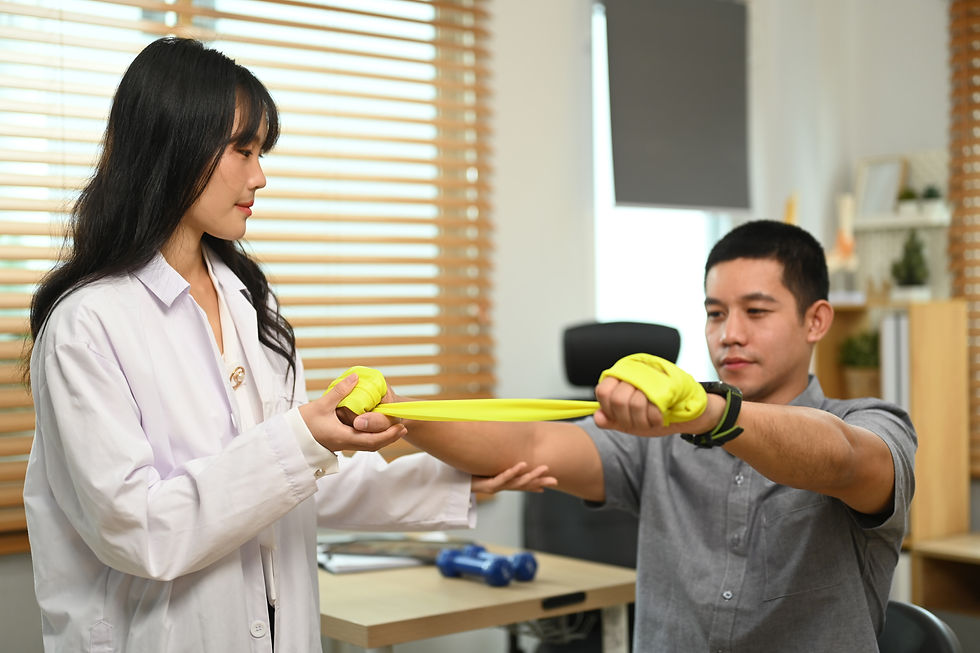Can Physiotherapy Really Help You Bounce Back from Sports Injuries?
- May 15, 2025
- 4 min read
Understanding How Tailored Therapy Can Get You Back in the Game Safely

Sports and physical activities offer numerous health benefits, but they also come with the risk of injury. Whether it is a muscle strain, ligament injury, fracture, or concussion, recovery requires more than just rest. Without proper rehabilitation, injuries can lead to long-term weakness, recurring pain, and a higher risk of future damage.
This is where sports physiotherapy plays a critical role. Through a structured recovery plan, physiotherapy helps restore strength, mobility, and function while reducing the likelihood of re-injury. With the right approach, athletes can return to peak performance safely and effectively.
How Can I Speed Up My Sports Injury Recovery?
Recovering from a sports injury takes time, but specific strategies can help accelerate healing while ensuring long-term results.
Follow the PRICE Protocol Immediately After Injury
In the first 48 hours after an injury, applying the PRICE method can help control swelling and pain while preventing further damage:
Protection
Support the injured area with a brace or bandage to prevent further strain.
Rest
Avoid movements that stress the injured site to allow initial healing.
Ice
Apply ice packs for 15 to 20 minutes every few hours to reduce swelling.
Compression
Use an elastic bandage to prevent excessive swelling and provide stability.
Elevation
Keep the injured limb raised above heart level to reduce fluid build-up.
These immediate steps create the foundation for effective rehabilitation.
Start Physiotherapy as Soon as Possible
Once the initial inflammation subsides, sports physiotherapy is essential for a full recovery. A customised physiotherapy program addresses the specific areas affected by the injury, helping to:
Restore range of motion through targeted stretching and mobility exercises
Rebuild strength in the muscles surrounding the injury
Improve balance and coordination to prevent future injuries
Guide a gradual return to sport with sport-specific drills
Early intervention with physiotherapy ensures a faster and safer return to activity.
Strengthen and Condition the Injured Area
Injuries often lead to muscle loss and weakness. Physiotherapists incorporate progressive strength exercises to restore function while avoiding further strain.
Effective strengthening exercises may include:
Resistance band training to rebuild muscle strength with controlled resistance
Bodyweight exercises such as lunges, squats, and core work for functionalovement
Aquatic therapy for low-impact muscle activation and rehabilitation
A structured strengthening plan reduces re-injury risk and improves overall performance.
Improve Proprioception and Stability
Proprioception, or the body's ability to sense movement and position, is often compromised after an injury. Physiotherapy retrains balance and stability to enhance coordination and prevent future injuries.
Key exercises for proprioception include:
Single-leg balance drills to improve ankle and knee stability
Balance board training to strengthen joints and enhance reaction time
Agility drills to refine movement patterns and control
By incorporating stability exercises, physiotherapy ensures a stronger and more resilient return to sport.
Maintain Cardiovascular Fitness Without Impacting Recovery
During injury recovery, it is important to maintain endurance and heart health without straining the injured area. Low-impact cardiovascular exercises help sustain fitness while supporting the healing process.
Recommended activities include:
Swimming and water exercises for full-body engagement with minimal joint stress
Stationary cycling to maintain cardiovascular endurance without high-impact movement
Elliptical training for controlled motion that reduces strain on joints
A carefully planned exercise routine ensures overall fitness while preventing muscle deconditioning.
What Is the Role of Physiotherapy in Sports Injury Recovery?
Physiotherapy is more than just a recovery tool. It is a strategic approach to rehabilitation, pain management, and injury prevention.
Tailored Treatment Plans for Specific Injuries
Every injury requires individualised rehabilitation strategies. Whether recovering from a ligament injury, muscle strain, or post-surgical repair, physiotherapy adapts to each case.
For example:
Muscle strains require targeted stretching and strengthening to avoid scar tissue formation.
Ligament injuries such as ACL or MCL tears involve progressive resistance exercises for joint stability.
Fractures require controlled weight-bearing activities to rebuild strength safely.
A physiotherapist ensures that recovery is structured, measured, and effective.
Pain Management Without Over-Reliance on Medication
Managing pain is crucial for a smooth recovery. Sports physiotherapy uses non-invasive techniques to reduce discomfort while promoting natural healing.
Common physiotherapy pain management strategies include:
Manual therapy to release muscle tension and improve circulation
Cold and heat therapy to reduce inflammation and relax stiff muscles
Electrical stimulation to activate natural pain relief responses
These methods help athletes recover without unnecessary dependence on medication.
Guidance for a Safe and Gradual Return to Sport
A well-structured return-to-sport plan ensures that athletes regain full function without increasing the risk of re-injury. Physiotherapists implement:
Sport-specific training to replicate game-time movements and build confidence
Performance enhancement techniques to restore endurance and strength
Bracing and taping strategies for added joint support
This progressive approach ensures that athletes return to competition safely and effectively.
Take Control of Your Recovery with Professional Physiotherapy
Recovering from a sports injury requires a combination of expert care, structured rehabilitation, and targeted strength training. Physiotherapy plays a critical role in restoring function, preventing setbacks, and optimising long-term performance.
At AquaPhysio Rehab Centre, we specialise in sports physiotherapy for muscle strains, ligament injuries, fractures, and post-surgical rehabilitation. Our evidence-based recovery programs help athletes regain strength, mobility, and confidence with a personalised treatment plan.
Do not let an injury hold you back. Book a consultation with a physiotherapist today and take the first step towards a full recovery.


